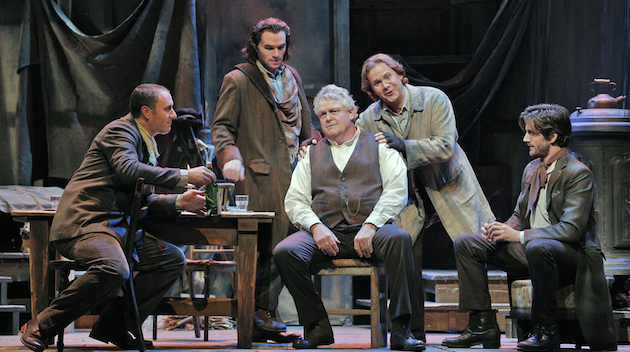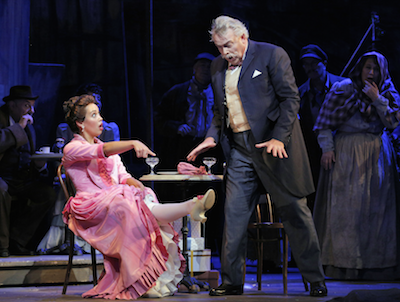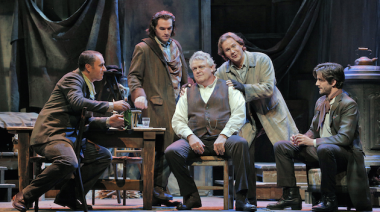
"The formidable and enduring Dale Travis once again conquered with the dual roles of Benoit and Alcindoro, making something memorable out of two usually throwaway comprimario portrayals."
Following up on that well-deserved praise for Travis' performance in last week's review of the San Francisco Opera's La bohème, I asked him about his long association with the company and his view of comprimario roles.
His replies are personal and illuminating about the essential role of singers situated between the stars and those In the Shadow of the Stars:
Q: Do you accept the "comprimario" description, what does it mean to you; if not, how would you characterize the roles you sing?
Thank you for this opportunity. We basses in this repertoire often get overlooked."Comprimario" is a correct designation if you take it from the Italian derivation "con primario," meaning "with the primary" (principal), referring to a performer who sings smaller roles. I don't look at it that way. I consider these roles as contributing to the whole, to make the performance the best it can be for the audience.
What's the famous line? "There are no small roles, only small actors" and they should never, ever be considered throwaway roles. I have only done my job when I give the best performance I can each and every time and then try to improve on it the next performance. This work ethic was taught to me a long time ago by my parents and when you achieve this level of consistency in anything you do, it is then coupled with compliments like "formidable, enduring, and outstanding."
Q: What is your history with San Francisco Opera?
If you look at the roles for basses, 80 percent of them are what the business calls "feature" or "supporting" roles. I've sung 35 roles with this great opera company since 1988, some leading, some feature or supporting. I've worked with the greatest artists of the 20th and now 21st century. I've learned so much from these experiences, first as an Adler Fellow, then as a solo artist.

Q: What are your favorite roles and how does Benoit/Alcindoro score on the list?
My first La bohème at San Francisco Opera was the 1988 production with Pavarotti, Freni, and Ghiaurov. I covered [as a standby to substitute, if necessary] my opera characterization teacher and mentor from the Cincinnati College Conservatory of Music, Italo Tajo, who was singing the roles of Benoit/Alcindoro in this show.I got to do a few stage rehearsals, and it was a thrill for this 28-year-old kid, let me tell you! Mr. Tajo did these roles later in his career, along with others like the Sacristan in Tosca and Geronte in Manon Lescaut to perfection. He passed down this standard of excellence to me and I have tried to uphold this tradition in my performances of the very same roles. I guess you could say they hold a certain sentimental value to me.
Other artists I worked with at SFO include the great Paolo Montarsolo and Renato Capecchi. I think these men, along with Maestro Tajo, greatly influenced my passion for the basso buffo repertoire. Roles such as Don Pasquale, Dulcamara, Bartolo, Magnifico, Leporello, and Don Alfonso, are some of my favorites. It is hard to chose though, because my repertoire is quite large, since I have a wide range and dramatic versatility. I have sung everything from Falstaff to Osmin and have had great success in the operas of Berg, Britten, Strauss, and Janáček.
Q: When you sing through a dozen performances in a two-week period — a dual role in every performance of a double-cast production — what are some of the logistical challenges, such as rapid costume and character changes, and how do you keep performances fresh?
What excites me the most as an artist are characters that are the catalyst for the conflict (drama). They can appear for three minutes or three hours. It doesn't matter. What does matter is that even the smallest role receives the same attention to detail as the larger ones. Every facet of the character is in the score — the melodic line, rhythm, notation, text, and orchestration — all determine character portrayal. It is our job to flesh them out and bring them to life.
Logistical challenges are not of great concern when you have a great team working with you back stage like we do at SFO. All of these things are worked out over the course of the rehearsal period. Keeping things "fresh" also is of little concern because it is a live performance with a live audience — no two shows are the same.
Benoit and Alcindoro are total opposites — in this production Benoit is a round, ruddy, somewhat scruffy man who really enjoys his drink and Alcindoro is a sharp, pompous peacock who likes to show off his latest possesions in public. When your juices get flowing on the very first downbeat of the music and your heart starts racing, that excitement to perform is what keeps it "fresh." I guess when that excitement no longer exists, it's time to retire. That hasn't happened to me yet.
If I may, I'd like to thank [SFO General Director] David Gockley and [SFO Director of Artistic Administration] Greg Henkel for all of their support over the years. I am forever grateful for the opportunities they gave me here and in Houston, Chicago, and L.A. Thank you!

